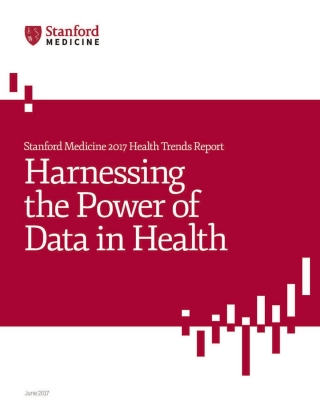Stanford Medicine Launches Health Care Trends Report
The inaugural issue of the report shows that big data will transform health care in the future but that more needs to be done to train doctors and patients in data management and analysis.
 Stanford Medicine today published its inaugural Health Trends Report, a comprehensive review and analysis of existing health care research and open-source data, combined with insights from Stanford faculty and external health care experts, on the current and emerging trends facing the health care sector.
Stanford Medicine today published its inaugural Health Trends Report, a comprehensive review and analysis of existing health care research and open-source data, combined with insights from Stanford faculty and external health care experts, on the current and emerging trends facing the health care sector.
The report, which will be published annually, found the promise and challenge of big data to be the most important forces driving change and improvements across health care.
Findings
The report outlines how all stages of the medical experience are being affected by big data, beginning with medical research and extending into and beyond the doctor’s office.
However, its most crucial finding is the need to train doctors and other medical professionals for a future in which analyzing and managing big data will be a core part of their roles. Improving their skills and literacy in computing and analytics, data management and assessment, information processing and software and technology-infrastructure development will be vital if the profession is to take advantage of the benefits of big data. This will require changes to how health care providers are taught the skills to deliver successful patient outcomes.
Similarly, the rise in wearable devices, genetic testing and other technologies gives patients more information than ever about their own health, making greater efforts to promote health literacy necessary so they can make informed decisions.
‘An opportunity and a challenge’
 “Today, health care is becoming increasingly connected but also increasingly complex. This unique dichotomy poses both an opportunity and a challenge for institutions like our own, whose job it is to heal, innovate and educate,” said Lloyd Minor, MD, dean of the School of Medicine. “In publishing this report, we hope to show how big data is the most important trend facing the sector and, in the process, inform and educate the entire medical community —including patients, doctors, the private and public sectors — who are actively shaping the future of health care.”
“Today, health care is becoming increasingly connected but also increasingly complex. This unique dichotomy poses both an opportunity and a challenge for institutions like our own, whose job it is to heal, innovate and educate,” said Lloyd Minor, MD, dean of the School of Medicine. “In publishing this report, we hope to show how big data is the most important trend facing the sector and, in the process, inform and educate the entire medical community —including patients, doctors, the private and public sectors — who are actively shaping the future of health care.”
“As big data becomes more of a resource for patients and their physicians, it simply is not enough to stick to the traditional ways of conducting research, engaging in patient care and educating the next generation of doctors,” he added. “Institutions like Stanford have a responsibility to drive advances in data management so that patients can be partners in their own care. By leveraging big data, we can create a vision of health care that is more preventive, predictive, personalized and precise.”
The report suggests that the following areas must be prioritized if the impact of big data in health is to be fully realized:
- Doctors and other members of the medical community must be more data literate and skilled in data analytics.
- Health care organizations need to have the right systems, processes and structures in place to manage big data.
- Silos and roadblocks across health care organizations that prevent effective data-sharing must be broken down, but protecting the privacy and security of patient data is paramount.
- Encouraging patients to take an active role in their own care and adopt healthier lifestyles remains critical, if challenging.
- Rising costs across the U.S. health care system threaten to undermine the role big data can play.
Reforms to electronic health records through the use of better technology and data management will help doctors provide more personalized patient care.
Copies of the report can be requested at [email protected].
- Login to post comments